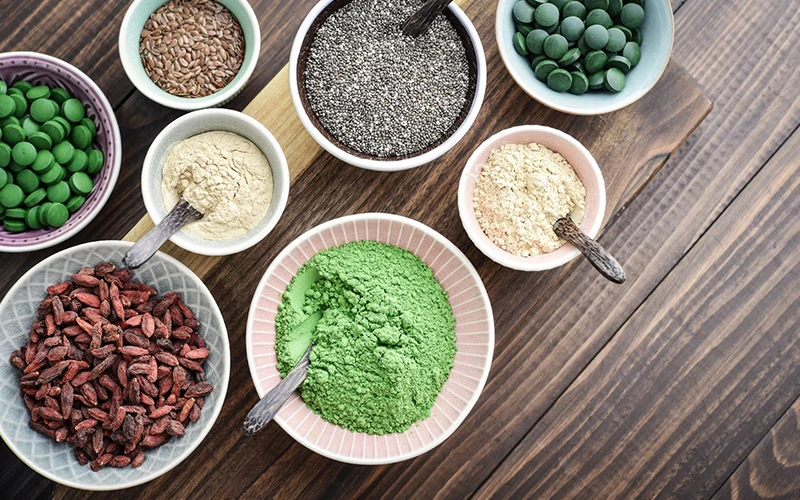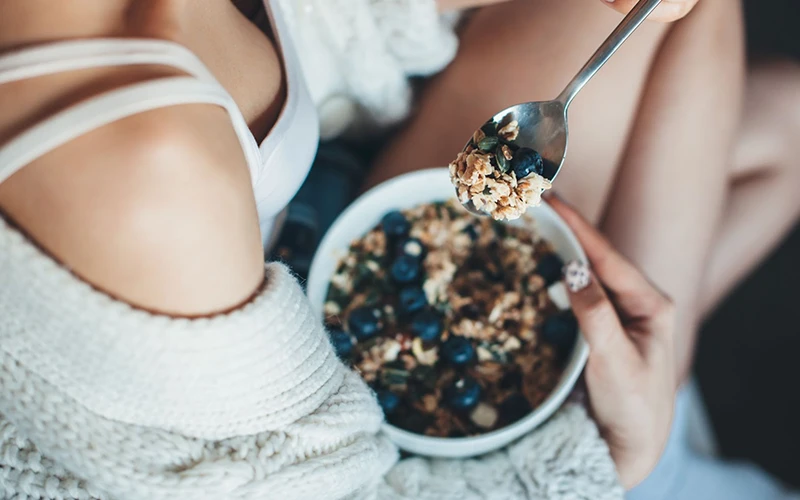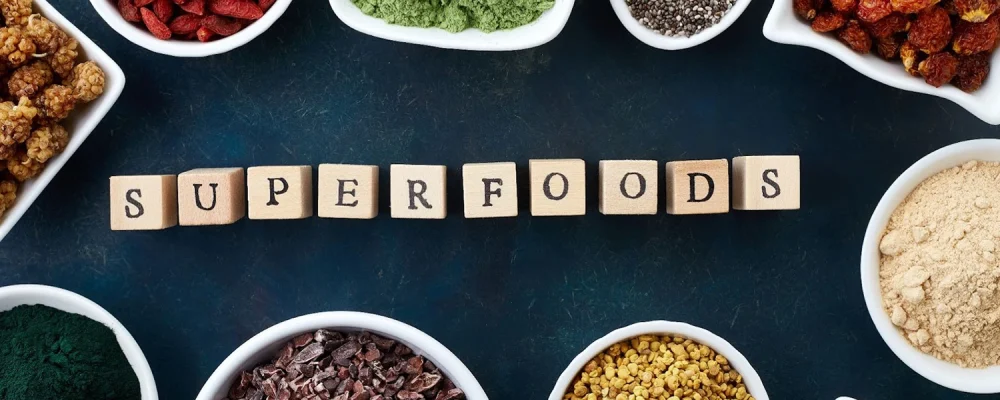Superfoods have been a hot topic in the health and wellness community. The term “superfood” was created by marketers to sell products and make certain foods more popular. They claim that these foods have many nutrients and may help improve health.
So, do these foods stand up to their reputation? This article will explain what qualifies as a superfood, provide some common examples and their benefits, and provide tips on including them in your diet.
What Are Superfoods?
Superfoods are highly nutritious foods that help fortify your body and keep you well. Though these foods are mostly plant-based, some fish and dairy products are qualified as superfoods because they have high amounts of nutrients.
Superfoods are foods that are packed with health-boosting compounds. They have an exceptional nutrient-to-calorie ratio, meaning they offer a significant amount of nutrients while being low in calories. These foods are abundant in minerals, vitamins, and antioxidants, making them highly beneficial for overall well-being.
What Foods Qualify As “Superfoods”?
The food industry coined the term ‘superfood’ to market certain products as trendy and nutritious. While many foods are indeed nutrient-rich, it’s essential to remember that no single diet can guarantee optimum health. As the term ‘superfood’ gains popularity, exploring healthier alternatives becomes crucial. These nutrient-packed foods offer a plethora of essential vitamins and minerals to support your overall well-being.
Superfoods are often low in calories while being rich in macro and micronutrients including protein, fiber, vitamins and minerals; therefore, eating sensible amounts of them won’t make you gain weight and it may offer weight loss benefits.
Superfoods are plant-based foods that are high in nutrients. Foods high in nutrients include whole grains, nuts, fruits, and vegetables. Blueberries, spinach, quinoa, and almonds are a few examples. Superfoods include dairy items like yogurt with probiotics and fish like salmon with omega-3 fatty acids.
What Do Superfoods Do?

Superfoods don’t have an official definition of nutrition, so there are no specific rules for a food to be called a superfood. However, the term is usually used for natural foods packed with nutrients and low in calories.
Moreover, eating these nutrient-rich foods can improve your health by strengthening your immune system, reducing the chances of getting sick, and maintaining overall well-being. They have different nutrients depending on the food, but in general, they are linked to:
- Keeping your heart healthy.
- Strengthening your immune system.
- Preventing cancer.
- Reducing inflammation.
- Lowering cholesterol levels.
Most Popular Superfoods and Their Benefits
Superfoods are rich in antioxidants and flavonoids that support overall wellness and may prevent coronary heart disease and cancer. Besides, consuming nutritious fruits and vegetables regularly is strongly linked to a decreased risk of various health conditions caused by lifestyle choices and overall mortality. Let’s learn about some popular nutrient-rich foods and their health benefits.
Berries: Nature’s Antioxidant Powerhouses
Berries tend to have a good nutritional profile. Among these nutritious berries, blueberries and strawberries are considered popular superfoods. Blueberries are superfoods because they contain many healthy vitamins, fiber, and plant compounds. These compounds, called phytochemicals, give plants their color and help them fight diseases.
Strawberries are also superfoods because they have a lot of vitamins, antioxidants, and fiber. They contain phytochemicals that make them red and may benefit our health.
Leafy Greens: Nutrient-Rich and Versatile
Dark green leafy vegetables (DGLVs) are nutrient powerhouses, providing folate, zinc, calcium, iron, magnesium, vitamin C, and fiber. They may reduce the risk of heart disease, type 2 diabetes, and certain cancers. Most liked DGLVs include kale, Swiss chard, collard greens, turnip greens, and spinach.
Nuts and Seeds: Healthy Fats and Plant-Based Protein
Nuts and seeds have lots of minerals and healthy fats, but they can have a lot of calories. Nuts and seeds with shells are great because you have to crack them, so you tend to eat them more slowly.
Whole Grains: Sustained Energy and Digestive Health
Whole grains, including quinoa, provide numerous health benefits because of their rich range of vitamins, minerals, fiber, and antioxidants. They support overall health, promote digestion, and contribute to a well-balanced diet.
Fatty Fish: Omega-3s for Heart and Brain Health
Eating fatty fish like salmon, sardines, and mackerel is good for your heart and can lower the risk of heart disease and stroke because they contain omega-3 fatty acids. A study reported that the benefits of eating fish outweigh the potential harm from mercury.
Green Tea
Green tea contains catechin, an antioxidant that protects cells and may prevent cancer. It offers benefits such as fighting heart disease and reducing blood pressure. Please include it in your diet for a guilt-free, caffeine-free boost.
Dark chocolate
Studies have shown that dark chocolate contains a high amount of flavonoids. Flavonoids are beneficial because they act as antioxidants, help prevent heart disease and certain cancers, and strengthen the immune system. What could be a better excuse to eat chocolate!
Superfood Powders
In addition to whole foods and fish, there are also superfoods available as a ready-mix powder. These powders are nutrient-rich and packed with antioxidants, which can help improve overall health. These powders are designed to provide optimal support for your well-being. Drinking superfood powder is a convenient way to have a healthy and balanced meal, especially in a hurry. It’s like having a nutritious meal on the go.
How to Incorporate Superfoods into Your Diet

After learning about all these superfoods, you might want to know how to add them to your daily meal. Here are some simple tips to help you add nutrient-rich foods to your meals and get your family to enjoy them:
Mix it: You can make tasty smoothies by blending leafy greens, veggies, yogurt, and fruit. They’re great as a cold snack or for breakfast. However, if you find blending difficult, superfood powders are easy to mix and can be a convenient alternative for adding nutritional value to your daily meal.
Add it on top: Sprinkle tomatoes, leafy greens, herbs, and nuts on salads, pizza, flatbreads, or wraps to add delicious flavors.
Make puree: Roast veggies and blend them into a smooth puree to use as a tasty sauce for meats. You can also puree cauliflower to thicken and enhance the flavor of soups and casseroles.
Swap it out: Try using spaghetti squash or zoodles instead of pasta, Greek yogurt instead of sour cream, and sweet potatoes instead of white potatoes.
Bake it: Use pumpkin, zucchini, and carrots to make moist and delicious bread, cakes, and muffins.
Cook differently: Explore new flavors by roasting, grilling, or broiling your veggies. Onions, garlic, broccoli, cauliflower, and tomatoes are excellent options.
Chop, shred, or dice it: Finely chop your produce to hide it in dips, salads, or salsas, making it easier to incorporate into your meals.
Add flavors: Make healthy food more exciting by using herbs, spices, vinegar, mustard, and capers to enhance the taste.
Common Myths About Superfoods
Myth 1: Beets, especially beetroot, boost your immune system and lower your chance of cancer.
In reality, consuming an excessive amount of beets can lead to constipation due to their high fiber content. Additionally, beets have the potential to reduce calcium levels and exacerbate kidney disease. If you have kidney problems, be cautious of how many beets you eat.
Myth 2: Eating more kale can improve your immune system and intestinal health.
Too much kale can harm your thyroid and cause a lack of iodine. Non-organic kale may have harmful pesticides that could increase the risk of cancer.
Myth 3: Spinach is a good source of iron and has anti-carcinogenic qualities.
Spinach does offer a good source of iron. But in reality, there are some downsides to consider. Certain compounds in spinach can raise the risk of kidney stones and gout. Non-organic spinach may contain pesticides that can disrupt hormones and increase cancer risk. Choose organic spinach or wash it thoroughly before eating to minimize these risks.
Myth 4: Coconut oil will improve your hair and skin.
There are some minor benefits to incorporating coconut oil for healthy skin and hair. However, the truth is that coconut oil contains a high amount of saturated fat. This type of fat increases your cholesterol levels and puts you at a higher risk of heart disease.
Myth 5: Broccoli reduces cholesterol, controls estrogen, and has anti-inflammatory effects.
The real fact is that it contains compounds that can disrupt the body’s balance if consumed excessively. For people on blood thinners, the high vitamin K in broccoli can make their medication less effective.
Do Superfoods Have Any Side Effects?
Superfoods, packed with high-density nutrients, can offer immense health benefits. However, consuming excessive amounts without proper guidance may lead to digestive discomfort, such as bloating, gas, or diarrhea, owing to their high fiber content. Some individuals might also experience jitters or nervousness after consuming nutrient-rich food powders, likely due to the fiber content.
It’s essential to be aware that some individuals may have allergies to certain nutrients, which could result in headaches, skin irritation, or asthma. Additionally, mild side effects like temporary diarrhea, nausea, or headaches may occur but should resolve quickly. Remember to consult with a healthcare professional to find the right balance and ensure a positive experience with these nutrient powerhouses
FAQs
Are Superfoods Suitable for Everyone?
Superfoods are generally safe and beneficial for most people. However, people with specific nutritional needs and potential allergies or sensitivities should be careful. It’s always best to consult a healthcare professional or registered dietitian for personalized dietary advice.
Should Superfoods Replace a Balanced Diet?
Superfoods are good to eat along with a balanced diet, but they shouldn’t be the only things you eat.
Can Superfoods Help with Weight Loss?
Some foods, like proteins, whole grains, and fiber-rich fruits and vegetables, can support weight loss by providing satiety and essential nutrients.
Are Superfoods Expensive?
While some foods can be more expensive or less readily available, many superfoods are affordable and can be found in local grocery stores or farmer’s markets. Additionally, focusing on seasonal and locally sourced superfoods can be cost-effective.
Final Thoughts
Superfoods encompass a range of health-boosting foods, enriched with antioxidants, vitamins, and minerals. They have been shown to offer numerous benefits for both the body and mind. While it’s not necessary to include superfoods in every meal, incorporating at least one serving daily is highly recommended. By embracing these delicious and nutritious additions to your diet, you provide your body with some of the finest and most essential nutrients.
RV Team
* Reviewology is in partnership or collaborates with top brands highlighted on this site, including those occupying the top ranking positions.
Additionally, we earn affiliate commissions from products showcased on this website when you make a purchase through the provided links on Amazon or the company website directly.
We appreciate your support using our links to purchase your favorite brands or newly discovered brands.
Latest updates
I Thought I’d Always Feel Tired, Fat, and Forgotten—Until This
310 Greens vs AG1
The Truth About 310 Greens: A No-Nonsense Review of This Popular Supplement
Popular
I Thought I’d Always Feel Tired, Fat, and Forgotten—Until This
310 Greens vs AG1
The Truth About 310 Greens: A No-Nonsense Review of This Popular Supplement
© 2024 Reviewology. All Rights Reserved.
